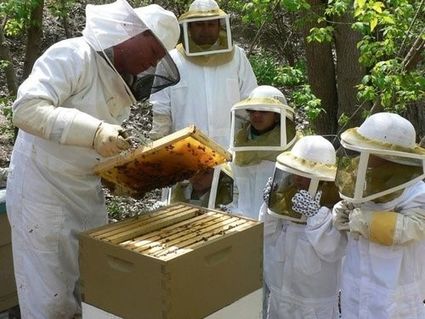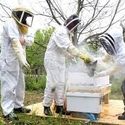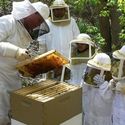Bees in the D Creating a Buzz in Metro Detroit
April 29, 2021

Educating school children on the importance of bees in the environment is a main focus of Bees in the D
Detroit resident Brian Peterson-Roest says he has always been a nature enthusiast. 13 years ago, when the Women's Garden Club of Rochester announced an opportunity to send a teacher on an all-expense paid trip to northern Michigan's Beaver Island to learn about beekeeping, he jumped on it. Peterson-Roest, a fifth grade science teacher in Rochester Community Schools, says he enjoyed the experience and fell in love with beekeeping. As a hobbyist beekeeper since 2010, Peterson-Roest says he found the practice to be very therapeutic and calming. Upon learning of the issues facing honeybee colonies in recent years including habitat loss, disease, climate change, pollution, and pesticides, Peterson-Roest decided to do something to help the bees.
In 2016, he founded Bees in the D to promote bee conservation and education about the familiar, buzzing insect. Bees in the D's mission is to create a cooperative effort between residents, schools, businesses, and organizations in Detroit and southeast Michigan to contribute to the health of honey bee colonies and native pollinators and to educate on their importance to the environment. To accomplish this, the organization holds presentations at local nature centers about bees and other pollinators, hosts workshops on beekeeping, and teaches about native plants that can be added to the garden that pollinators love.
"I just felt like there are so many misconceptions and misunderstandings about bees that I wanted to help educate from age one all the way up to 100," he says. "Then also on the other side of it, the conservation (idea) and help with their populations...and started looking at native bees as well, not just honey bees."
While considered a pest in most cases, bees are beneficial and necessary creatures, pollinating roughly one-third of the food we eat. Of the nearly 20,000 bee species in the world, over 4,000 of those species are native to North America and in need of conservation efforts.
Since 2016, Bees in the D has introduced over 10 million bees and managed over 170 honey bee hives at more than 50 Michigan locations including Oakland University, the 23rd District Court in Taylor, MLK High School in Detroit, and numerous orchards and urban gardens in southeast Michigan. Bees in the D also manages bee hives on green roofs at Detroit's TCF Center, the Beltline Center, and atop the Beaubien garage at the GM Renaissance Center. The organization is 100 percent volunteer-driven.

Science teacher, Brian Peterson-Roest founded Bees in the D in 2016 to promote bee conservation efforts.
If you want to do something to help the bees, Peterson-Roest suggests planting native plants to encourage bees and pollinators including butterflies, using less pesticides in your yard and garden, or setting out a bowl of water with rocks in it so bees and butterflies can quench their thirst. He adds bees are not really the scary, aggressive creatures many think of and are actually too busy to bother with humans. He cautions, however, that warm weather brings "swarm season," where bee colonies split up when they outgrow the hive. When swarming, they appear as a large ball of bees clustered together, often found on trees, sides of buildings or on the ground. "Your first instinct may be to spray them," says Peterson-Roest. "Don't spray. Let a beekeeper know or give us a call, we will come out and capture that swam so that we can get them into a safe hive and manage them."
Peterson-Roest emphasizes the importance of having bees around. "If you like diversity of food, we need our pollinators," he says. "If you want almonds and fruits and vegetable to maintain a reasonable price, we need our pollinators because if we don't have them, the supply is going to go way down and the prices are going to go way up."
Bees in the D's website is chock full of educational information and videos. Go to http://www.beesinthed.com. All donations to Bees in the D are tax-deductible and go directly to education and conservation efforts.












Reader Comments(0)